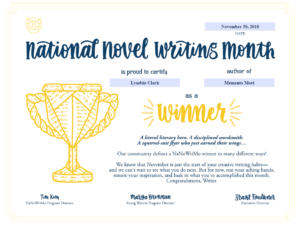So you wanna write a novel, huh? You sit down, blank page (or Word Document, or Scrivener) open–full of possibilities.
“All I have to do is start with the first sentence and then go to the end, right?”
NO.
Today, I am going to give you two bits of advice I wish someone had given me (or I wish I had listened to) anytime in the last 20 years.
Plot Your Story
Since it is NANOWRIMO (National Novel Writing Month) time, this is a great time to expound on one of my most painful “lessons learned” moments. NANOWRIMO is all about getting a first draft written. “It doesn’t have to be good, as long as it’s there!” and “The first step to writing a novel is to write it.” NANOs will tell you. And yes, to an extent, getting the first rough draft done is important because if you don’t have that, you have literally nothing. However…a good novel, or even a functional one, does not end there.
For years I was a self-proclaimed “pantser” i.e. someone who didn’t make an outline and just let her story and her characters take her along for the ride. I had no idea where I was taking my story and just wrote shit down as it came to me. Think of this experience similar to one where you let a toddler or a cat take you on a tour of your own house and tell you what’s important. Cute at first, but they miss important things like “where does the food come from?” or “who cleans?”
What. A. Bloody. Mess.
To an extent, I still pants a bit when appropriate, though now I refer to it as more “plantsing” (plotting+pantsing). Sometimes characters surprise me. Sometimes the plot turns in a direction I don’t expect. But the difference now is that I have an idea where things are going. Not only an idea, but an act-by-act outline. While this outline is not set in stone, it gives me a good path to follow. This way, my foreshadowing actually means something. The story keeps a much more consistent flow. The minor scenes are free to float around in a semi-controlled bubble. It keeps inconsistencies to a minimum.
You may think you don’t have “time” to plot or delve into the “whys” of the story or the characters’ motivations, or you may be just too darn excited to get your beautiful opening scene on paper. But trust me, you will waste far more time revising, and revising, and rewriting, and scrapping the whole damn thing, than you would spending two days making a great outline.
Let’s face it–You can write the prettiest scenes in the world, but if you don’t have a solid underlying foundation, they’re just fluff (or “purple” prose). A good story is more than just fancy-pants language. A good story needs a meaning. It needs bones and teeth and internal organs. These are the icky things that readers don’t see outright, but whose absence is noticed. Just think of how pretty Johnny Depp would be if he didn’t have any internal structure…ick.

And, no matter how much you think you know the meaning of your tale, that doesn’t matter at all if your audience can’t get it. (Unless you’re writing for yourself and never intend it to see the light of day. But c’mon, most of us want our work seen). This is where a second pair of trained eyes comes in.
Get A Writing Coach
Okay so, now that you’ve written your outline, or your whole story, or you just have a really great idea, you need feedback. I’m not saying from your mom, your best friend, or even other armchair, self-proclaimed writers. You need a writing coach–especially if you haven’t had any other formal training in creative writing.
(Sometimes an editor will do this too, but these are really two different services. Editing perfects your words. Coaching perfects your idea).
You may not think you need one, but trust me, you do. If you are really serious about putting a book out in the world and having people read it, you want to give everyone your best work, right? Well, before you can do that, you need someone to give you the hard answers. Because without challenge in our work, how can we ever improve? No one picks up a pen at 5 years old and becomes an award-winning painter.
Just like you don’t just put words down on a page, call it a story, and become a best-selling novelist. That shit takes time…anyone who tells you differently is selling something…and those are services you don’t want to buy into. Save your money for a book coach instead. When I talk about getting feedback, I’m not referring to the “Oh it’s great!” comments from your friends who read a paragraph or two of your work. Those will come in time, but right now, at the beginning of your journey, you don’t need them.
You need someone to say, “This story has no heart, let’s work on that”. Or at least, that’s what I needed. Was it crushing? Yes. Did I get angry? A little. Did I cry? A few tears were shed. However, at the end of all of that, you know what I felt? R E L I E F. I have literally been waiting for someone to tell me that my entire writing life. Now, this is not me being self-deprecating or looking for placations or fishing for compliments. This is me being realistic.
I need to know where I suck so I can get better.
And so do you.
And don’t tell me you already know everything, because I know you know you don’t! Also, don’t hold onto the assumption that you can just read your way to success. While resources like Layer Your Novel or Story Genius are invaluable, there is no substitution for a set of experienced and empathetic eyes providing feedback on your work. You are too close to your content. You’ll never see the gaping holes because–admit it–you’re probably standing in one thinking, “This is fiiiiine”.
So, contrary to what you want to happen, it’s important to understand: the desire to write is not the same as having skill in writing. Skill takes time, practice. Skill takes someone–a professional–telling you where you’re missing the mark so you can work even harder to achieve it.
Trust me.
Do this.
It’s worth the money.
It’s worth saving you years of obsession and headache and self-doubt.
It’s worth it to not have to scrap a quarter of a million written words because you started off on the wrong path.
Seriously. I am not a writing coach (though after my experience, maybe I should be) but a writing coach has changed my entire outlook on what it means to “be an author”.
Writing is my passion and has been for longer than I care to admit. According to my NANOWRIMO profile, I have written almost 600,000 words over the last 18 years. And that’s not counting the number of words I wrote and deleted, or those I wrote on things that were not my NANO novels, or those I rewrote after deleting others.
My current novel/series is 8 years old. Sometime around 4-5 years ago, I began to realize the value of plotting when I went through and corrected sooo many inconsistencies and hanging plot lines (i.e. the giant questions that never got answered). I mean, it was garbage. I actually wrote in the book “no one knows why X” because I didn’t know why. That is unacceptable.
I was today years old when I truly realized the value of a book coach. While I still have a ton of work to do, and am by no means an expert on this topic, for the first time in ever, I feel a legit, actual direction.
I only wish I’d done this sooner so I didn’t waste so many countless hours slamming out letters on a keyboard….
Learn from my mistakes, kids. Save yourself (and your writing!)

Lyndsie Clark is a participant in the Amazon Services LLC Associates Program, an affiliate advertising program designed to provide a means for sites to earn advertising fees by advertising and linking to Amazon.com.


